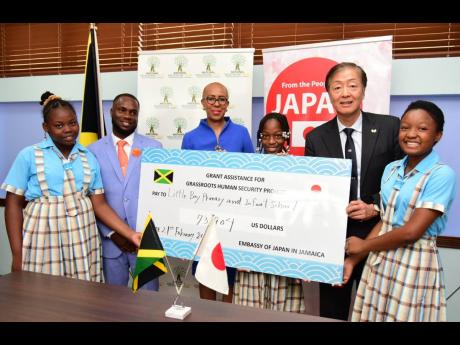School bus grants bring joy, relief
Little Bay Primary looks forward to safer transport, less reliance on bike taxis
Ackecia Gayle, head girl of Little Bay Primary and Infant schools, beamed with joy on Tuesday after hearing Education Minister Fayval Williams announce that her Westmoreland-based institution would be getting a new school bus valued at US$73,904.
Ackecia is just one of hundreds of students who travel to school daily on bike taxis operating in contravention of the Road Traffic Act, sometimes with up to six children on a motorcycle at a time.
Getting on a bike taxi is one many children and parents in rural Westmoreland communities say is unavoidable, given that it is the cheapest, fastest and most reliable mode of transportation in some districts.
The $100-per-stage ride, Ackecia admitted, is uncomfortable and scary at the same time, but one she has to endure to attend classes as she prepares for her Primary Exit Profile tests.
“Sometimes, you don’t know which one to trust because sometimes they have accidents because di road dem too [bad], and when you tell them (the drivers) to slow down, dem tell you you’re not supposed to tell them how to ride the bike,” she told The Gleaner.
“Sometimes, I don’t feel safe because some kids have accidents with them, so I [oftentimes] feel kind of scared. Also, on the road is very rough and it’s very unpleasant on the bike taxi,” she said, following the grant signing ceremony at the offices of the Ministry of Education and Youth for the purchase of school buses for both Little Bay Primary and Infant in Westmoreland and Old Harbour High School in St Catherine.
Little Bay Primary Principal Keron King was also elated to hold the cheque that will pay for the bus.
When he first went to the school five years ago, he had no choice but to ride on the dangerous bike taxis.
“It is the primary mode of transportation [there]. It took a while for me to get used to it,” King admitted.
The headmaster said that he intends to have discussions with the Ministry of Education and Youth and other stakeholders to create a budget and work out an arrangement to purchase fuel and finance the bus service as he does not want to introduce a cost to the students and their parents.
“Some students are part of the Rural Bus Programme, so we are seeking to get some additional funding to offset the cost for that,” King told The Gleaner.
The purchase of the bus will be made possible through grant assistance from the Embassy of Japan in Jamaica, under their Grassroots Human Security Project of the Government of Japan.
Over the past five years, National Education Trust (NET) has been collaborating with the Embassy of Japan with a view to identifying public education institutions in need of support in critical areas such as transportation and infrastructure development. This partnership yield success, whereas, funding totalling approximately US$1 million (J$150 million) has been spent advancing the education sector in Jamaica.
Under this particular aspect, in a bid to assist the education ministry with the Rural Schools Transportation Programme, institutions located in the various parishes have benefited. A total of 261 schools – 121 high and 140 primary schools – have been targeted for similar intervention.
In addition to Old Harbour High and Little Bay Primary and Infant schools, other schools that benefited include Oracabessa Primary, Buff Bay Primary, New Forest Infant, Primary & High School, Lyssons Primary, Richmond Park Primary and Lacovia High.
Since 1995, the grant assistance under the Grassroots Human Security Project has totalled approximately J$1 billion for 110 projects across all sectors in Jamaica.
Williams, for her part, said the provision of these buses comes against the background of the ministry’s expanded pilot school bus programme, under which schools in need submit requests, whether directly or through the NET to the Embassy of Japan in Jamaica, for consideration under the Grant Assistance for Grassroots Human Security Projects.
“I am sure that the school community here also deeply appreciates this help. As it is with a number of rural schools, students must travel long distances without the requisite public transportation infrastructure to support them. The Government’s Rural School Bus Programme continues, but we know it does not meet full demand,” Williams said.
“The students of Little Bay Infant and Primary in Westmoreland have been making do with what was available to them. We have seen the media images of children riding to school on bike taxis, often with no safety gear, bundled on to a single motorbike. Not only were the students being allowed by adults to participate in a practice that was in contravention of the Road Traffic Act, but they were in danger without even knowing it,” she said.

